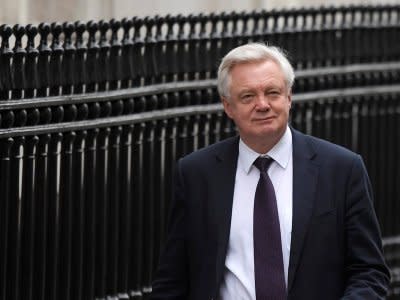EU readies 'David Davis-proof' Brexit summit

Thomson Reuters
By Jan Strupczewski and Gabriela Baczynska
BRUSSELS (Reuters) - The European Union plays down talk by Britain's Brexit minister that last week's interim accord is not binding and will launch new talks on Friday that are "David Davis-proof", a senior EU official said.
The comment on Tuesday followed Brexit Secretary Davis's weekend remark that outline divorce terms were more a "statement of intent" than legally binding.
The EU official told reporters that EU leaders meeting on Friday will ram home in guidelines to their negotiator that Britain must honor its agreements so far if it wants to discuss the future free trade treaty it wants.
Davis himself pledged to convert last Friday's deal into "legal text" as soon as possible after he spoke to the European Parliament's Brexit point man. Guy Verhofstadt branded Davis's earlier comment "unhelpful" and said that what the EU executive calls a gentleman's agreement must be made legal.
British and EU officials said that would mean agreeing the formal withdrawal treaty within the coming year so that it can be ratified by their parliaments before Brexit in March 2019.
Davis's EU counterpart, Michel Barnier, said he aimed in the new year to present a draft of a withdrawal treaty that would reflect the accords struck with Prime Minister Theresa May last week on settling financial obligations, the rights of expatriate citizens and ensuring no "hard" EU border with Northern Ireland.
Adding to the debate over how far London is bound by May's deal, Barnier insisted there should be "no backtracking" if London is to have the trade negotiations it so much wants.
That is spelled out in legal language in the negotiating guidelines which leaders are expected to approve on Friday after May has left the summit: "Negotiations in the second phase can only progress as long as all commitments undertaken during the first phase are respected in full and translated faithfully into legal terms as quickly as possible," the draft guidelines read.
That, the senior EU official said, made clear there could be no going back, as Davis had implied might be possible: "The guidelines are David Davis-proof," the official said.
Guidelines were sent by summit chair Donald Tusk to the 27 other national leaders on Friday. They were little changed when their aides met on Monday to prepare the meeting, principally to spell out more clearly the timing of the next steps in the process and to emphasize continuing obligations on London.
An intention to start negotiating a transition period from Brexit to a future trade pact early in 2018 now includes a plan to be able to launch talks in January. The new draft makes clearer that talks on what happens after transition will start only after further guidelines are agreed in March.
Tusk, in his formal letter on Tuesday inviting leaders to the summit, warned there was no time to lose and highlighted a gnawing concern in Brussels that keeping divergent interests among the 27 in check may be much harder when it comes to a free trade treaty than it has been in settling Britain's divorce.
"This will be a furious race against time, where again our unity will be key," Tusk wrote. "And the experience so far has shown that unity is a sine qua non of an orderly Brexit."
EU officials expect relatively straightforward talks on the transition period, given British desire for a quick deal and EU insistence that it be as simple as possible; essentially Britain will retain all its obligations as an EU member, as well as many of its rights -- except, crucially, any say over EU decisions.
Starting trade talks will require, first, more information from May on what future deal she wants. Davis spoke at the weekend of a free trade pact similar to but better than one the EU concluded last year with Canada -- "Canada Plus Plus Plus".
But it will also require hard bargaining among the 27, who have very different relationships and interests with Britain.
(Additional reporting by Alastair Macdonald in Brussels and William James and Kate Holton in London; Writing by Alastair Macdonald; Editing by Matthew Mpoke Bigg)
See Also:

 Yahoo News
Yahoo News 
